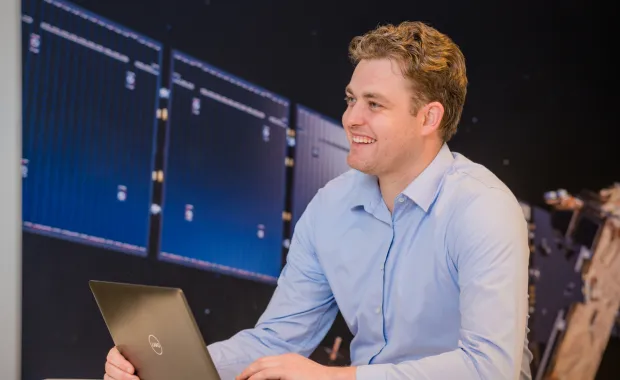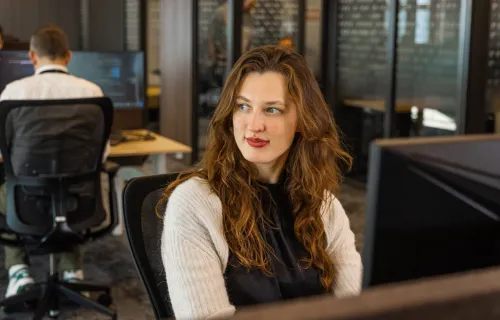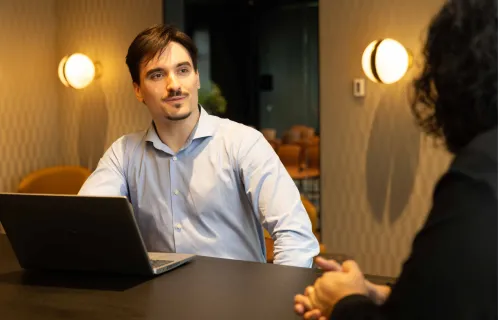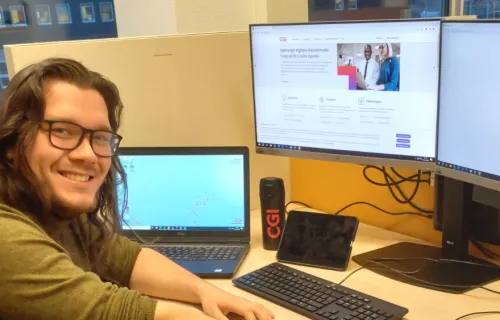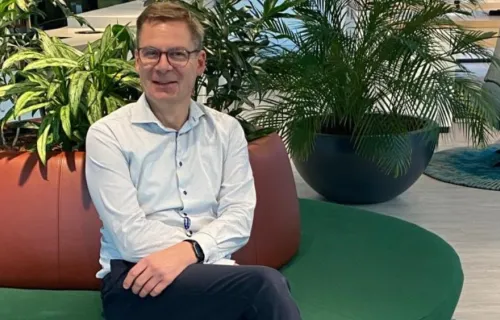Nick Poelstra works at CGI as a Software Consultant in the Space sector. Among other things, he is involved in the global satellite navigation system Galileo and shares his expertise in the Space Academy. 'The space department feels like a small family,' he says.
'Dozens of Galileo satellites orbit the Earth at a distance of 23,222 kilometers. They communicate with two ground stations: one in Italy and one in Germany. The satellites send signals to Earth and these are used for navigation; as most people are familiar with from their cell phones. I am part of the Design Authority team at CGI. We work on the software for the Galileo Control Centers: shielded locations all over Europe, where all communication around Galileo takes place. Our job is to optimize the existing systems, maintain them and implement new functionalities and integrate them smoothly into the operational environment.'
The space department feels like a small family
'Galileo's satellites consist of several components. Such as antennas that send navigation signals and timing and signal generation systems. These all have to work together with each other, the various (software) systems on the ground and operators at the various locations. We ensure that these systems continue to function optimally. This means that we regularly implement improvements: from new functionalities to replacing pieces of outdated hardware. In such a way that everyone involved suffers as little as possible and the technical process between the components is not disrupted. But no matter how big or small adjustments are and how well we do our job, Galileo remains a very complex system where we have to pay attention to many dependencies. This always presents some challenges, but that's part of the game. The solution is not only in the technical side of things, but also in taking along and training the operators who have to work with the systems. That makes my work versatile: it is about technology and people.
Space Academy
From designing architecture to providing advice and developing and giving training courses: it's all possible within CGI. For example, I regularly give courses from the CGI Space Academy: a platform where we share knowledge and expertise about the space industry. From knowledge about navigation systems to the use of earth observation data. Among other things, we offer a basic introductory course that is taken by every new colleague at CGI Space. We also have the Space Graduate Class for recent graduates, in collaboration with CGI's Technical Software Engineering Masterclass. In this two-month course, we run through all the common tasks: from Java coding to scrum and agile working in a space environment. But also the content topics and technical issues you'll face, such as systems engineering, satellites and GPS. And then there are our monthly, free and publicly accessible Lunch Lectures via YouTube. To bring together the space community inside and outside CGI, share knowledge and show what cool projects we are doing within CGI Space.'
Family
The space department within CGI almost feels like a family. But just different. Because all 'family members' are screened by the General Intelligence and Security Service. Because we have access to highly confidential information that can disrupt a country or a system. That entails a great responsibility, but I also notice that it strengthens our bond: we are responsible together. Another thing I like about working in space is that by definition you work with international colleagues. After all, the Netherlands is too small to handle space travel on its own. International cooperation expands my world. And because space travel is an incredibly high-tech environment, I keep developing myself constantly. There is always something new to learn and it never gets boring. For many people, space is something far away from them, literally and figuratively. For me, it's my daily work environment and that's secretly pretty cool.
